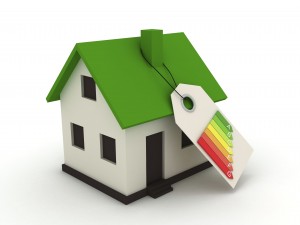Green Deal energy savings?
The Government launched its Green Deal (http://ow.ly/hbqJ3) yesterday – a money and energy saving scheme designed to encourage people to make their homes more energy efficient. It works a bit like a student loan – you pay for it, but because it takes so long and makes you such a richer, better person along the way, you don’t really notice. Apparently.
Under the Green Deal, an independent assessor inspects your home and recommends some energy saving improvements, like lagging the loft or getting a more efficient boiler, that would save you money in the long run. Rather than pay for the improvements right away, you borrow the money through your electricity or gas supplier. Because your house is now so green, it costs less to heat, and the money saved is used to pay off the loan.
The Golden Rule at the heart of the Green Deal is that no one should be worse off overall, because the money you save on utility bills should always be more than the cost of the loan for the improvements.
As an example, it costs between £100-£350 to install cavity wall insulation into the average house. And you can save up to £135 a year in heating bills as a result – so after three years you’re in profit. But if the loan is spread out over even more years and is actually paid for by the difference in your electricity bill, you may not even notice paying for it. Sounds brilliant doesn’t it?
In theory it should work very well – especially if you live in a draughty house with no insulation and a clapped out boiler. But would the power companies be falling over themselves to back this if it were that simple?
Those wise owls at the consumer watchdog, Which? (http://ow.ly/hbqym) have, as usual, been doing their homework and have come up with a few things to think about before you commit.
1 Find out whether you are considered a low user of electricity already – if you live alone and already use very little power you may not shave enough off your power bills to cover the loan.
2 Is your electricity use likely to go up? If you are planning to add to your family or bring an elderly relative to live with you or get a lodger, your bill is likely to go up anyway – again making it difficult to cut your bills down by enough to cover the loan.
3 If your house is listed, in a conservation area or already insulated, you may not need or be able to bring in all the changes necessary to make the savings anyway.
4 Be wary of assessors trying to flog you improvement work – the Green Deal assessors hired to check what improvements you need may be vetted and approved but they may also be working on commission – and they charge about £100 to assess your home. Don’t sign up to anything the same day and remember you are free to shop around.
5 The Green Deal loan is attached to the property – not the owner or tenant – so if you sell up, the new owner will have to take the loan on too. They will benefit from the energy efficiencies you have brought in but won’t have your appreciation of the cut in energy bills – after all, they’ve never paid them – so they may not be too keen to take on what they see as someone else’s loan.
In our case – with fewer people living in our house over the next few years as the children grow up and leave home (allegedly), and plenty of room for improvement, it might be worth it. But first I’ll see what I can manage for free – by swapping to a cheaper energy supplier, turning the thermostat down to “Rainforest” from “Sahara”, shutting my bedroom window and checking the girls’ rooms for glowing hair straighteners.
And while I’m at it, I’ll unplug that bossy energy use monitor – turning off those racing numbers has got to save me a few kilowatts over time!


Leave a Reply
Please login or register to leave a comment.